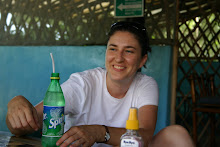
Last week I was riding on the school bus returning from a field trip to the Fresno Fair. The teacher sitting next to me jokingly tried to convince some of the students that the bus was still in Fresno, even though we had traveled through the country and were now coming upon houses in our little town. One student replied, "No, we're not - there aren't any stoplights."
I was struck by this perspective and it reminded me that childrren make their own observations and come to their own conclusions without adult instruction. Their fresh outlook sometimes startles me and it makes me want to listen more as a teacher. There are ideas in their heads that we may never know about if we don't take that time to hear them.
In my classroom I try to let my students problem-solve when issues arise. For example, recently I honestly didn't know how to stack all the different-sized student chairs in my classroom so that the janitor could easily vacuum. I asked two of my third grade students to help after school and together we figured out a workable solution. They are now my "chair experts." The more I invite students into the process of thinking collaboratively, the more I realize that students are very capable (just small and inexperienced) thinking human beings.
I've heard that educators often overestimate children's academic abilities and underestimate their creative abilities. I believe this resource of brain power may go to waste in classrooms where teachers do lecture-style, direct instruction style of teaching all day.
Why bring this up? I'm excited to think about what my students may come up with when we start to discuss poverty. What are their perceptions? What are their solutions? What do they think?
I was struck by this perspective and it reminded me that childrren make their own observations and come to their own conclusions without adult instruction. Their fresh outlook sometimes startles me and it makes me want to listen more as a teacher. There are ideas in their heads that we may never know about if we don't take that time to hear them.
In my classroom I try to let my students problem-solve when issues arise. For example, recently I honestly didn't know how to stack all the different-sized student chairs in my classroom so that the janitor could easily vacuum. I asked two of my third grade students to help after school and together we figured out a workable solution. They are now my "chair experts." The more I invite students into the process of thinking collaboratively, the more I realize that students are very capable (just small and inexperienced) thinking human beings.
I've heard that educators often overestimate children's academic abilities and underestimate their creative abilities. I believe this resource of brain power may go to waste in classrooms where teachers do lecture-style, direct instruction style of teaching all day.
Why bring this up? I'm excited to think about what my students may come up with when we start to discuss poverty. What are their perceptions? What are their solutions? What do they think?

